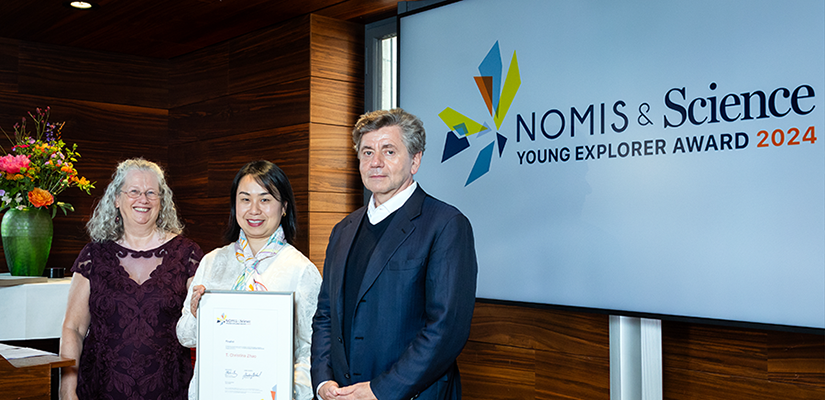Award recognizes young researchers pushing the boundaries of science I-LABS faculty, Dr. Christina Zhao was recognized as a finalist for the 2024 NOMIS & Science Young Explorer Award. This prestigious award recognizes early-career researchers whose innovative research pushes the boundaries of science and aims to address the fundamental questions at the intersection of the life and social sciences. The award recognizes scientists doing interdisciplinary … Read More
New Research: Mother-infant face-to-face interaction in a 2-brain experiment at three months shows neural synchrony between the two brains, which predicts word production at 15 months
Dr. Yaara Endevelt-Shapira and colleagues presented research results in a poster at the 2025 Society for Research in Child Development (SRCD conference). The poster is titled “How mother-infant inter-brain synchrony is affected by the context of the interaction and speech input?” In this result, Mother-infant face-to-face interaction in a 2-brain experiment at three months shows neural synchrony between the two … Read More
Dr. Kuhl Briefs United States Congress
In May, I-LABS Co-Director, Dr. Patricia Kuhl, shared the latest research about early childhood learning and brain development with members of the US Senate and House of Representatives at an event hosted by the Aspen Institute. The Aspen Institute Congressional Program is a nongovernmental, nonpartisan educational program. It provides Senators and Representatives the opportunity to delve into complex and pressing … Read More
Psychology Today article on gender stereotypes and STEM an “Essential Read.”
Psychology Today article on gender stereotypes and STEM an “Essential Read.” Allison Master’s article, When It Comes to Gender Stereotypes, Not All STEM Fields Are the Same, was positioned as an Essential Read by Psychology Today editors. This article summarizes the most recent work on gender and STEM stereotypes, a study done in collaboration by researchers at the University of Houston and … Read More
STEM Stereotypes are not the same
New research published in the Proceedings of the National Academies of Sciences suggests that it may be time to re-evaluate how we think about STEM stereotypes. Researchers based at University of Houston and University of Washington found a big difference in stereotypes. Both girls and boys felt like computer science and engineering is “for boys.” However the researchers did not see … Read More
ParentMap Recognizes Christina Zhao as a 2025 Superhero
Each year, ParentMap recognizes a select group of individuals working hard to make a difference for kids and families in Washington. This year, the magazine’s editors recognized I-LABS faculty, Dr. Christina Zhao for her groundbreaking research on how infants perceive and process the world of sound around them. “Early development is foundational — it shapes so much of who we become,” … Read More
Rodolfo Cortes Barragan’s research on night sky visibility is one of the most downloaded articles of the year.
I-LABS scientist Dr. Rodolgo Cortes Barragan published one of the most downloaded articles in Scientific Reports. The article, which focuses on how the ability to see the stars impacts our curiosity and wonder about the universe, was one of the Top 100 downloaded Sustainability papers published in Scientific Reports last year. In the study, I-LABS scientists Rodolfo Cortes Barragan and Andrew Meltzoff … Read More
Dr. Meltzoff to participate in the Annual Allen L. Edwards Psychology Lecture
I-LABS Co-Director, Dr. Andrew Meltzoff has been invited to participate in the 17th Annual Allen L. Edwards Psychology Lecture: The Science of Altruism. This event, moderated by KUOW Host Bill Radke, brings together leading experts from psychology, anthropology, neuroscience, and animal behavior to explore the biological, cognitive, and social foundations of altruistic behaviors. Dr Meltzoff will be joined by the … Read More
Data science course takes Neva Corrigan to the next level
Research scientist Neva Corrigan makes major breakthrough with the help of UWPCE data programs. I-LABS research scientist Neva Corrigan is featured in a new feature story from the University of Washington’s Continuum College. The story details Neva’s experience enrolling in enrolled in the UW Certificate in Data Science at UW Professional & Continuing Education (UWPCE). Read the article via UW Continuum College
I-LABS collaborator, Allison Master honored with prestigious award by White House
Allison Master, former I-LABS Postdoc and current collaborator has been awarded the Presidential Early Career Award for Scientists and Engineers (PECASE) by the White House. This award is the highest honor bestowed by the U.S. government on outstanding scientists and engineers early in their careers. PECASE recognizes scientists and engineers who show exceptional potential for leadership early in their research careers. Allison … Read More









